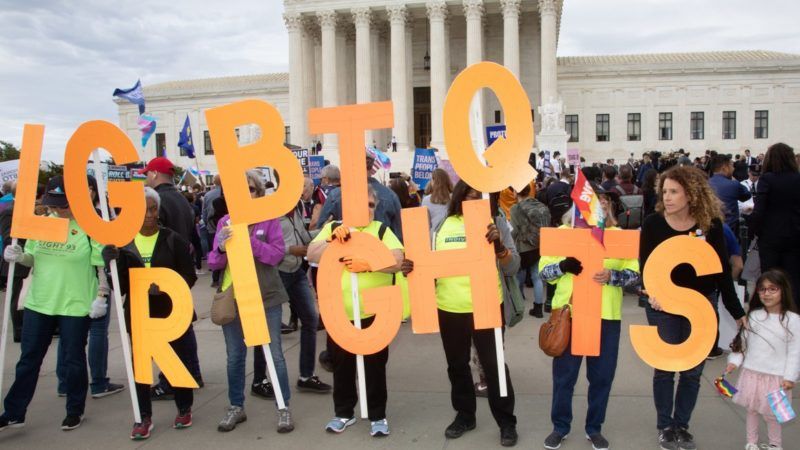Supreme Court Rules, 6–3, That LGBT Workplace Discrimination Violates Civil Rights Act
Justice Neil Gorsuch's majority decision offers a textualist argument for the ruling.

Discriminating against an employee for being gay or transgender violates the Civil Rights Act of 1964, the Supreme Court ruled Monday in a 6–3 decision.
Justice Neil Gorsuch wrote the majority decision, joined by Chief Justice John Roberts and justices Elena Kagan, Sonia Sotomayor, Stephen Breyer, and Ruth Bader Ginsburg.
"An employer who fires an individual for being homosexual or transgender fires that person for traits or actions it would not have questioned in members of a different sex," Gorsuch argued. "Sex plays a necessary and undisguisable role in the decision, exactly what Title VII forbids."
Title VII of the law forbids discrimination on the basis of sex; the heart of the dispute was what exactly that means. The three cases the court considered—Bostock v. Clayton County, Georgia; Altitude Express v. Zarda; and Harris Funeral Homes v. the Equal Employment Opportunity Commission—revolved around two cisgender men and one transgender woman who claimed they were fired from their jobs for being either gay or trans.
While courts and lawmakers have typically treated sexual orientation and gender identity as separate categories from "sex," a Supreme Court precedent from 1989, Price Waterhouse v. Hopkins, held that discrimination on the basis of whether a person is stereotypically feminine or masculine violates the Civil Rights Act. The court had already found that sex discrimination covers not just whether a person is male or female, but also ideas about how men and women are supposed to behave.
Does that cover discriminating on the basis of who people have sex with or which sex people present themselves as? According to today's court ruling, it does.
Gorsuch's participation in the majority decision should not come as a surprise. During oral arguments last October, he observed that sex did appear to be playing a role in the termination of the two fired men because they were fired for the sex of their partners, something that would not have happened if they were heterosexual.
Gorsuch's decision follows a textualist reading of the Civil Rights Act. While Congress likely did not consider the possibility that sexual orientation or gender identity would be included within the term "sex" back in 1964 when the Civil Rights Act was passed, textualists focus on the language used rather than legislative intent.
Some important passages from Gorsuch:
An individual's homosexuality or transgender status is not relevant to employment decisions. That's because it is impossible to discriminate against a person for being homosexual or transgender without discriminating against that individual based on sex. Consider, for example, an employer with two employees, both of whom are attracted to men. The two individuals are, to the employer's mind, materially identical in all respects, except that one is a man and the other a woman. If the employer fires the employee for no reason other than the fact he is attracted to men, the employer discriminates against him for traits or actions it tolerates in his female colleague.
Later in that same paragraph, Gorsuch explains how this also applies to the treatment of transgender employees:
Or take an employer who fires a transgender person who was identified as a male at birth but who now identifies as a female. If the employer retains an otherwise identical employee who was identified as female at birth, the employer intentionally penalizes a person identified as male at birth for traits or actions that it tolerates in an employee identified as female at birth. Again, the individual employee's sex plays an unmistakable and impermissible role in the discharge decision.
Gorsuch's order concludes with a pure expression of textualism: "In Title VII, Congress adopted broad language making it illegal for an employer to rely on an employee's sex when deciding to fire that employee. We do not hesitate to recognize today a necessary consequence of that legislative choice: An employer who fires an individual merely for being gay or transgender defies the law."
This is a significant ruling in states that do not already have their own laws forbidding discrimination on the basis of sexual orientation or gender identity (only 21 states cover both categories already).
In his dissent, Justice Samuel Alito, joined by Justice Clarence Thomas, accuses the majority of legislating from the bench and rejects Gorsuch's argument that his decision is a textualist reading. They argue that sexual orientation and gender identity are categories separate from sex and are not included in Title VII:
The Court attempts to pass off its decision as the inevitable product of the textualist school of statutory interpretation championed by our late colleague Justice [Antonin] Scalia, but no one should be fooled. The Court's opinion is like a pirate ship. It sails under a textualist flag, but what it actually represents is a theory of statutory interpretation that Justice Scalia excoriated—the theory that courts should "update" old statutes so that they better reflect the current values of society.
Their dissent is followed by an appendix of 11 pages of various dictionary definitions of the word "sex."
Justice Brett Kavanaugh wrote his own dissent. He wrote that it is the responsibility of Congress to amend the Civil Rights Act and determined that "As written, Title VII does not prohibit employment discrimination because of sexual orientation." He noted that the federal government has added new employment discrimination protections not through the courts, but via lawmaking. He argues, "Judges may not update the law merely because they think that Congress does not have the votes or the fortitude. Judges may not predictively amend the law just because they believe that Congress is likely to do it soon anyway." He adds that by taking an overly literal textual approach, the majority is deliberately ignoring the ordinary definition of the words "sex discrimination" and how most people approach the phrase.
Read the ruling for yourself here.


Show Comments (189)